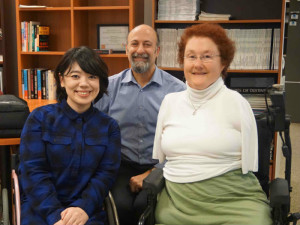This article is also available in: 日本語
In part 1 of visiting Pacific ADA Center report, I have shared issues regarding laws related to people with disabilities.
In part 2, I focus more on employment for people with disabilities, which is my research topic.

Jan, the Program Manager at the Pacific ADA Center, is an interesting example of a person with a disability seeking employment.
Jan was born with her disability, which is the absence of her arms and legs.
Oklahoma City, her hometown was not really accessible and at the time ADA was not established, yet.
Her parents, however, were very strong advocates. They let Jan go to a private school in order to receive good education.
If she would have gone to a public school, she could have received only special education at that time.
She went to college in California and studied international relations.
What she surprised me was she even studied abroad in Paris, France for 1 year.
Paris was not really accessible either.
After coming back to the U.S., she went to a law school back in Oklahoma and worked for a judge after graduation.
She met her husband and moved to California again.
Since then, Jan has worked mostly for disability communities in the Bay Area.
Jan, using her power wheelchair operated with her shoulder, herself had faced discriminations when she did job hunting after law school.
It was right after ADA passed.
She had different interviews with law firm. Many times, those interviews were short.
She felt that interviewers didn’t want to talk to her.
In a worse case, interviewers started talking about a basketball game during interview and didn’t ask her any questions.
Although she tried to change the topic to “her” interview, the interviewers didn’t change the conversation. Eventually she asked them to end the interview.

“Equal opportunity” is one of the phrases I often hear from people who advocate for disabilities rights in the US.
When it comes to employment, equal opportunity is considered important to all people, not only to people with disabilities.
The concept of equal opportunity came from civil rights movement in 1964 which became a base of ADA which passed in 1990.
It has been years since civil rights movement and ADA came out.
But, still equal opportunities are not offered enough in the US employment market.
For example, nowadays many employers require all applicants to apply for a job via online.
Some online forms are not accessible to some people with disability so that people with disabilities cannot apply from the beginning.
Even if they could apply somehow, the online application form might not be well-written or well-organized because of inaccessibility of the online form.
In the end, the employers would notice that the applicants have disabilities.
Those applicants end up disclosing their disabilities to employers automatically even if they do not want to disclose.
Although people with disabilities are working in various fields in the US, some employers have unconscious discrimination that they don’t promote employees with disabilities after hiring.
For instance, I have seen a person in wheelchair working at store and giving a basket to customers before.
I was very surprised because I have never seen anyone in wheelchair working at stores in Japan.
But in reality in the US, not all but some stores hire people with disabilities and position them in the front of the store and show,
“We hire people with disabilities!”
for corporate PR, and do not really promote employees with disabilities.
Jan asked employers,
“How many people with disabilities do you have in management?
I am a manager for many years, so I really want to know how many higher level people with disabilities do they have.
I usually try, without being mean, to challenge them a little bit to think a little higher than mail room or the entry level position.
In general, employment needs to be better. There needs to be more opportunities for people to move up.”

Creating an equal opportunity for all people is very difficult, because each one has a different purpose or preference of career.
In Japan, especially people with disabilities and without disabilities are often separated starting from education stage.
So they barely know each other. What we need here is active communication, I think.
Employers should communicate actively with applicants with disabilities. Don’t judge that people with disabilities cannot do work without really knowing them.
People with disabilities should communicate actively with employers. Keep showing your abilities and educating employers to make more equal opportunities.
I don’t want both employers and people with disabilities to give up communicating from the beginning. We can communicate if we try.
And we all can make this situation a lot better.
